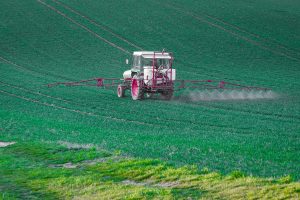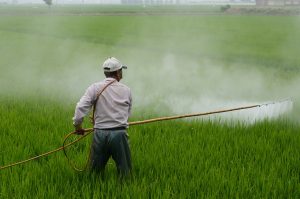 There are many reasons to become educated on the herbicide Paraquat: it’s very dangerous, very toxic, and unfortunately studies are starting to indicate that it can cause serious disease if you’re exposed to it in any length of time.
There are many reasons to become educated on the herbicide Paraquat: it’s very dangerous, very toxic, and unfortunately studies are starting to indicate that it can cause serious disease if you’re exposed to it in any length of time.
What is Paraquat? / Why is it used?
Paraquat is a toxic chemical that is widely used in this country, particularly in the eastern half of the United States where there’s a lot of farmland, orchards, agricultural areas. It is used as an herbicide, a plant killer primarily for weed and grass control.
It’s also used as a drying agent for certain crops; the technical term for that is desiccant. It is also used as a defoliant. So again, its main use is to control weeds and grasses that grow in an agricultural setting when you’re trying to grow some kind of crop. It’s also used as a drying agent for certain crops, like cotton, prior to harvest.
The good news is that Paraquat is not something you can obtain easily. It’s not something you can buy over the counter; you can’t get it at Lowe’s or Home Depot, or you certainly shouldn’t be able to get it there. And it’s not to be used for home landscaping, weed control on your lawns, nothing like that. In fact, it’s a restricted use pesticide (RUP). And so what that means is you must have a license to buy the product Paraquat. You must be a licensed applicator, to buy Paraquat to mix it up and to apply it to farmland.
Unfortunately it is common that these restricted use pesticide licenses are used by people who then allow some of their workers to apply the Paraquat to crops and other environments for weed control. And so it’s not just those people with licenses that may end up being vulnerable to injury and disease. But it’s any worker that handles this product.
One article I read suggested that Paraquat has gotten more popular in the United States partly because some weeds and grasses have become resistant to glyphosate, which is the active chemical in Roundup and because of that, they need a more effective weed killer and that’s where Paraquat comes in. So even though it’s highly toxic, highly dangerous, it’s become more popular over the last 20 years.
Now, as I wrote in an article a few months ago on my website, www.northcarolinaproductliabilitylawyer.com, I was introducing my readers to some of the basics of Paraquat. And one thing I noted is that it is highly toxic and even poisonous and that I’ve read that even a thimble-full of it, if you ingest it, it could be fatal and so, it’s a horrible chemical for safety reasons, even while it is highly effective at weed control and drying out crops like, hay, cotton, things like that.
Some of the brand names that you might find Paraquat out there is Firestorm, Cyclone, Helmquat, Parazone, Parashot, and Gramaxone. So, those are some of the brand names but Paraquat is the name of this chemical that we’re dealing with and that I’ll continue to use today.
Who Uses Paraquat?
 Obviously, agricultural workers might have access to Paraquat and might be asked to put it on crops, whether they’re spraying it by hand, after they mix it up with water or if they are driving a tractor and covering larger amounts of farmland. Farmworkers, crop dusters, pesticide applicators, tanker workers, pretty much anyone who works in the agricultural industry or works with orchards or even vineyards, might have access to Paraquat. Again, there has to be the RUP license, the restricted use pesticides license to buy it but I do think people who work with people who have the license may be asked to apply it. Anybody who works in this industry or any of these industries needs to be aware that it’s out there and it could be possibly dangerous for you.
Obviously, agricultural workers might have access to Paraquat and might be asked to put it on crops, whether they’re spraying it by hand, after they mix it up with water or if they are driving a tractor and covering larger amounts of farmland. Farmworkers, crop dusters, pesticide applicators, tanker workers, pretty much anyone who works in the agricultural industry or works with orchards or even vineyards, might have access to Paraquat. Again, there has to be the RUP license, the restricted use pesticides license to buy it but I do think people who work with people who have the license may be asked to apply it. Anybody who works in this industry or any of these industries needs to be aware that it’s out there and it could be possibly dangerous for you.
Let me say that if you work in agriculture or in a vineyard or an orchard, you probably know what you’re doing and you probably know if Paraquat is involved in the day’s work. So for those people, you got to be very vigilant and you probably need to listen to the rest of this podcast because there’s some important health information.
So, I’ve talked about all the places that Paraquat might be used as a weed control chemical or as a drying agent—desiccant. The primary crops that it’s used to fight off weeds and is often used in relation to the growing of soybeans, cotton, corn, rice, tobacco. It’s used extensively in the eastern half of the United States. And that’s pretty obvious because there’s a lot of farmland in the eastern half of the United States. It is a very common in my home, North Carolina, because there are many farms in this state and throughout the east coast. If you live in this part of the country you’re probably not far away from a farm that has used Paraquat in the last year or more recently.
Paraquat and Parkinson’s Disease
 Studies have started to indicate a significant and alarming connection between the exposure to Paraquat, the use of Paraquat, and the development of Parkinson’s disease. Now, Parkinson’s disease is a brain disorder that can lead to trembling, shaking, stiffness in the body, difficulty with balance, coordination, walking. As with most diseases, these symptoms usually come on gradually and maybe imperceptibly for months or years. But as the disease progresses, people have more trouble with the trembling, more trouble with walking and balance, and it can become a debilitating disease.
Studies have started to indicate a significant and alarming connection between the exposure to Paraquat, the use of Paraquat, and the development of Parkinson’s disease. Now, Parkinson’s disease is a brain disorder that can lead to trembling, shaking, stiffness in the body, difficulty with balance, coordination, walking. As with most diseases, these symptoms usually come on gradually and maybe imperceptibly for months or years. But as the disease progresses, people have more trouble with the trembling, more trouble with walking and balance, and it can become a debilitating disease.
I won’t go into too much detail about the science behind the studies that show how exposure to Paraquat can lead to Parkinson’s disease. But I just want to do some high-level discussion of why it happens and why epidemiologists and scientists believe there is a significant connection between exposure Paraquat and Parkinson’s.
The main issue seems to be this concept of oxidative stress. It’s essentially an imbalance between the production and accumulation of oxygen reactive species and cells and the antioxidant defenses that are able to neutralize these oxygen reactive species. There are a lot of environmental factors that can lead to harmful levels of oxidative stress in the body and that it can include non-Paraquat conditions or triggers like obesity, exposure to radiation, smoking cigarettes, pollution, that kind of thing. But what scientists are increasingly finding in the studies is that exposure to toxic pesticides and specifically Paraquat can cause this extreme oxidative stress. It can cause it at such a level that it can damage areas of the brain that are otherwise able to function properly and cause injury and acute damage, such that Parkinson’s disease can develop in the brain. So obviously there’s more to the story of the science connecting Paraquat to a higher risk for developing Parkinson’s disease, but that gives you a thumbnail of why they think this is occurring and how it can damage one specific part of the brain that can lead to Parkinson’s disease. For more information there are studies out there that you can read and learn more about specifically, if you’re an individual who spent the last few years (or even less time) working in a farm-like setting.
Paraquat Regulations
At least with respect to the United States, there has not been a ban on Paraquat and the EPA, as recently as October 2020, reapproved Paraquat for use in the United States. Now, let me re-emphasize that not everybody can buy this product. I cannot purchase Paraquat. You probably may not be able too. You must have a Restricted Use Pesticide license to even purchase the chemical. There are serious warning labels on the bottles of Paraquat that talk about how poisonous it can be. But I think it’s really important and I need to emphasize that the EPA takes the position that the connection between Paraquat and Parkinson’s disease is not strong enough to justify a ban. So even while there might be a strong warning on the Paraquat bottle that it’s toxic and even fatal if swallowed (and it certainly can kill you if you drink any amount of it), the EPA is not yet willing to warn the consuming public about the growing science showing a connection between Paraquat and Parkinson’s disease.
Now even though the EPA hasn’t banned Paraquat in the U.S., the chemical has been banned in 32 countries. Many countries in Europe banned Paraquat for use in the 1980s and 1990s. The United States will not follow suit and that’s I think unfortunate. And sadly, I think it must be mentioned that the EPA’s refusal to ban such a dangerous chemical in the United States may very likely have something to do with the way the United States always seems bow down to large corporate interests and profit-making opportunities and Paraquat is certainly a profitable chemical that is sold by Syngenta and (for a period of time) Chevron, who will turn out to be the key defendants in the litigation that is emerging over Paraquat.
If you want to hear more about the connection between health care and the overwhelming obsessions with profit in this country, I invite you to listen to a podcast I did a few months ago with my good friend Dr. Jerome Hoffman. It’s called “Excessive Testing, Diagnosis and Treatment: A Conversation with Dr. Jerome Hoffman.” And in that podcast we talked a lot about how the profit motive in this country leads to some very unhappy results in medicine, health care, and all of corporate America.
Paraquat Litigation: Do You Have a Case?
Paraquat litigation is on the rise. It’s no secret that because Paraquat has been shown to increase the risk and perhaps cause the development of Parkinson’s disease, lawsuits have been filed against the manufacturers of Paraquat. The two key defendants in this operation are Syngenta and Chevron USA (for the period of time when Paraquat was sold by Chevron). So do you have a possible case? The answer is, you must check some serious boxes to be eligible for a lawsuit here. First you have to be able to confirm exposure to Paraquat. All detail is important in any litigation, but certainly this one you want to be able to establish that you worked in an agricultural setting, worked on a farm, an orchard, a vineyard; you need to be able to establish that you used Paraquat, applied it to crops, applied it to the fields. Dates are very important, as are receipts. If you’re one of the people who have the license to purchase Paraquat, all those receipts are vitally important. How often did you apply the Paraquat and how often were you exposed to it? Any details like that are very helpful.
There may be other opportunities for people who lived near farmland, perhaps right beside a farm where crop-dusting took place regularly or tractors applied Paraquat over a period of months or years. Proximity might be another way you can be exposed. Also, scientists believe airborne drift may lead to unhealthy exposure. If you live within five or ten miles of a farm where Paraquat is regularly used and then as the years pass, you develop Parkinson’s disease, then you may be in line to pursue litigation against these big Paraquat defendants.
Second, you need to have a diagnosis of Parkinson’s disease. If not a diagnosis you need to exhibit many of the symptoms that are associated with Parkinson’s. But let me be very clear: if you have been exposed to Paraquat and you are having symptoms of trembling or shaking, difficulty walking, difficulty with balance but you don’t have a diagnosis of Parkinson’s disease, I’m afraid you need to get to a doctor and get diagnosed and find out what’s wrong. You need to do that regardless of what you choose to do with any litigation.
There are also some other serious ailments and diseases that may develop that you need to be aware of. If you have been exposed to Paraquat and while you don’t yet have a Parkinson’s disease diagnosis, you’ve got kidney disease or renal failure or certain symptoms consistent with Parkinson’s disease, then you may well have a claim in the Paraquat litigation.
This litigation is very new, and a multidistrict litigation site has recently been established in June 2021, in federal court in the Southern District of Illinois. As of last week there were 60 cases filed, but obviously there’s going to be dozens more cases filed soon. The studies are increasing that show a real connection between this seriously toxic chemical and the development of a horrible and debilitating disease: Parkinson’s.
That’s the story of Paraquat for today. It’s not a happy story and I hope you were never exposed to the chemical at work. If you were exposed, and you’ve developed this disease, you may want to look into your whether you should be involved in the litigation. You can always reach out to me at my firm Harris Sarratt & Hodges in North Carolina. My number is (919) 546-8788.
Again, stay healthy, be well, and good luck.
 North Carolina Product Liability Lawyer Blog
North Carolina Product Liability Lawyer Blog

